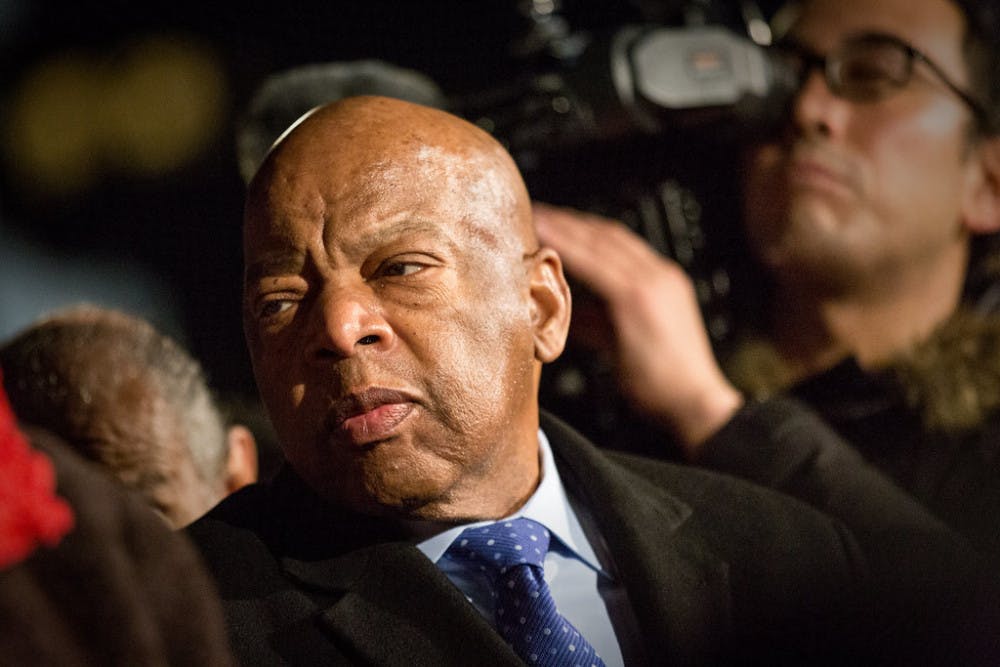[caption id="attachment_46896" align="aligncenter" width="475"] COURTESY PHOTO
COURTESY PHOTO
Lewis is the last remaining member of the “Big Six” civil rights leaders of the 1960s, along with Martin Luther King Jr., Philip Randolph, Roy Wilkins, Whitney Young Jr. and James Farmer Jr.[/caption]
“Hate is too heavy a burden to bear.”
This is one of the sentiments that U.S. Congressman John Lewis (D-Ga.) expressed when he spoke at the Flynn Center for the Performing Arts in Burlington on Monday, Oct. 7. The talk was also live streamed in the Mahaney Center for the Arts for students and community members who wanted to attend without leaving campus.
Lewis said his commitment to fight hate continues to drive his dedication to the civil rights movement. He visited Vermont to speak about his graphic novel trilogy, “March,” and how the stories relate to our current political and social climate.
“March,” co-authored by Andrew Aydin and illustrated by Nate Powell, is about Lewis and his life’s work as an activist. Inspired by Dr. Martin Luther King Jr.’s radio broadcasts, Lewis highlights the challenges he faced and his journey to where he is today.
“March” is also the Vermont Reads selection for this year by the Vermont Humanities Council, one of the sponsors of the event.
Lewis, who was introduced by Senator Patrick Leahy (D-Vt.), spoke to a sold-out audience about the book, his experiences in the civil rights movement and its continuation today, growing up in rural Alabama and what he sees as modern social justice issue priorities.
Lewis is the last remaining member of the “Big Six” civil rights leaders of the 1960s, along with Martin Luther King Jr., Philip Randolph, Roy Wilkins, Whitney Young Jr. and James Farmer Jr. In the pursuit of social justice, Lewis has dedicated his life to nonviolent protests and activism. When Lewis was younger, he participated in the Freedom Rides to challenge public transportation segregation, and organized demonstrations to oppose segregation at lunch counters in Nashville, Tenn.
Lewis said that every year, he travels back to Alabama to retrace the route from Selma to Montgomery that he marched for human rights for people of color.
At the talk, Lewis recounted the dehumanization he felt as a child when he was denied a library card due to the color of his skin, and a memory of where he was beaten by police officers and woke up in the hospital with Martin Luther King, Jr. standing by his side.
Lewis has experienced multiple arrests and injuries over the years from his involvement in nonviolent protests. He considers each of his 45 arrests worthwhile — 40 of which took place in the 1960s, and another five of which occured since he was elected to congress.
At the event, Lewis emphasized the importance of nonviolent protesting, and the significance of using adversity as fuel for positive change.
“Those of us who got involved in the sit-ins in 1960 — we embedded, hard, the essence of [“March”] in our very souls,” he said.
“Every time we were beaten, arrested and jailed, we didn’t strike back,” Lewis continued. “We destroyed by sitting in.”
Melanie Chow ’22 attended the talk in Burlington with members of her Race, Rhetoric, and Protest class. She was moved by hearing Lewis speak — immediately after returning from the event, she ordered a copy of the book herself.
“A lot of people are activists when they’re younger and then they stop, but [Rep. Lewis] never did — he never stopped working, never stopped caring,” she said.
Chow felt the event added nuance to some of the history lessons students typically learn in school.
“We learn about the civil rights movement in history class in high school, but those lessons are his life,” she said. “He was there — he lived through those experiences, and it’s really inspiring.”
Olivia Peterson ’21, who attended the talk with her African American Literature class, expressed a similar sentiment.
“During Lewis’ talk I found myself repeatedly hit with the realization that the man on stage before me was actually there during the rise of the sit-ins, there for the Freedom Rides, for the March on Washington, for countless beatings and moments in between,” Peterson said, “This came as a vivid reminder of how recent the civil rights movement truly is.”
Peterson left feeling inspired by Lewis’ call to action.
“Hearing John Lewis advocate for making the ‘good and necessary’ kind of trouble is effectively a call to not get complacent in the comfort of being part of the dominant majority,” she said.
Lewis closed his speech by bringing attention to the current state of the nation, and the unruly attitudes that spew hatred toward American minorities.
“We’ve come a distance, but we still have a distance to go,” Lewis said. “Today in America, there are forces trying to take us back. We’ve come too far, and we’re not going back.”
“You have to make a little noise. You have to get in the way, and you have to get in good trouble, necessary trouble,” Lewis said of his experiences as an organizer. “When you see something that is not right, not fair, not just, you have a moral obligation to say something, to do something, to speak up, and speak out.”
Rep. John Lewis discusses civil rights movement legacy

COURTESY PHOTO
Lewis is the last remaining member of the “Big Six” civil rights leaders of the 1960s, along with Martin Luther King Jr., Philip Randolph, Roy Wilkins, Whitney Young Jr. and James Farmer Jr.
Comments



